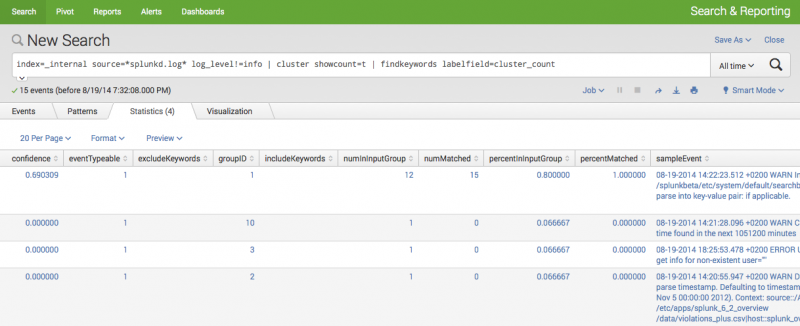findkeywords
The findkeywords command is an internal, unsupported, experimental command. See
About internal commands.
Description
Given some integer labeling of events into groups, finds searches to generate these groups.
Syntax
findkeywords labelfield=<field>
Required arguments
- labelfield
- Syntax: labelfield=<field>
- Description: A field name.
Usage
Use the findkeywords command after the cluster command, or a similar command that groups events. The findkeyword command takes a set of results with a field (labelfield) that supplies a partition of the results into a set of groups. The command derives a search to generate each of these groups. This search can be saved as an event type.
Examples
Return logs for specific log_level values and group the results
Return all logs where the log_level is DEBUG, WARN, ERROR, FATAL and group the results by cluster count.
index=_internal source=*splunkd.log* log_level!=info | cluster showcount=t | findkeywords labelfield=cluster_count
The result is a statistics table:
The values of groupID are the values of cluster_count returned from the cluster command.
See also
| dump | makejson |
This documentation applies to the following versions of Splunk® Enterprise: 7.0.0, 7.0.1, 7.0.2, 7.0.3, 7.0.4, 7.0.5, 7.0.6, 7.0.7, 7.0.8, 7.0.9, 7.0.10, 7.0.11, 7.0.13, 7.1.0, 7.1.1, 7.1.2, 7.1.3, 7.1.4, 7.1.5, 7.1.6, 7.1.7, 7.1.8, 7.1.9, 7.1.10, 7.2.0, 7.2.1, 7.2.2, 7.2.3, 7.2.4, 7.2.5, 7.2.6, 7.2.7, 7.2.8, 7.2.9, 7.2.10, 7.3.0, 7.3.1, 7.3.2, 7.3.3, 7.3.4, 7.3.5, 7.3.6, 7.3.7, 7.3.8, 7.3.9, 8.0.0, 8.0.1, 8.0.2, 8.0.3, 8.0.4, 8.0.5, 8.0.6, 8.0.7, 8.0.8, 8.0.9, 8.0.10, 8.1.0, 8.1.1, 8.1.2, 8.1.3, 8.1.4, 8.1.5, 8.1.6, 8.1.7, 8.1.8, 8.1.9, 8.1.10, 8.1.11, 8.1.12, 8.1.13, 8.1.14, 8.2.0, 8.2.1, 8.2.2, 8.2.3, 8.2.4, 8.2.5, 8.2.6, 8.2.7, 8.2.8, 8.2.9, 8.2.10, 8.2.11, 8.2.12, 9.0.0, 9.0.1, 9.0.2, 9.0.3, 9.0.4, 9.0.5, 9.0.6, 9.0.7, 9.0.8, 9.0.9, 9.0.10, 9.1.0, 9.1.1, 9.1.2, 9.1.3, 9.1.4, 9.1.5, 9.1.6, 9.1.7, 9.1.8, 9.1.9, 9.2.0, 9.2.1, 9.2.2, 9.2.3, 9.2.4, 9.2.5, 9.2.6, 9.3.0, 9.3.1, 9.3.2, 9.3.3, 9.3.4, 9.4.0, 9.4.1, 9.4.2

 Download manual
Download manual
Feedback submitted, thanks!